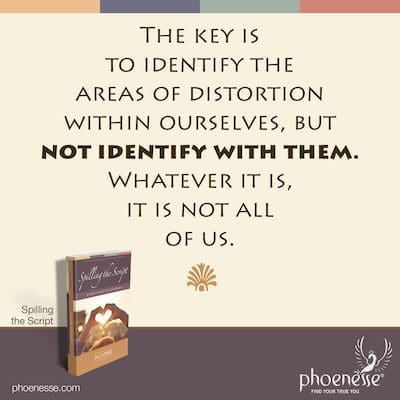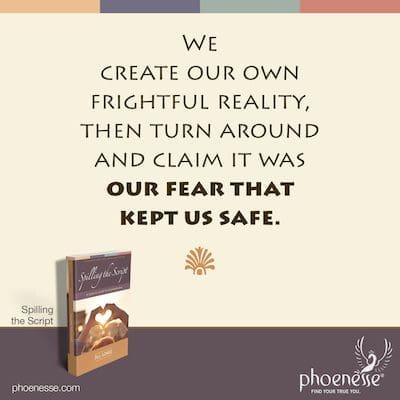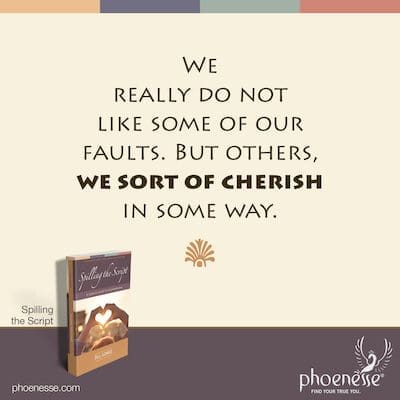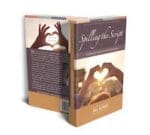All human beings have faults, which are places in us that are in distortion. Our faults serve separation and not connection, and that is how we know they belong under the umbrella of Lower Self. Because they are part of the domain of Lower Self, all our faults fall into one of three main categories: self-will, pride or fear.

Pride encompasses both the attitudes of being better than and less than—we wouldn’t have to make ourselves seem better than if we didn’t feel like we are less than—and is the opposite of humility. Just naming pride, once we identify it, is often all that’s needed to let go of it.
Fear breeds resistance and resistance breeds fear, including fear of truth.
Fear is an emotion, so if we feel it, it changes. We can “smell” it in another, but once we resolve our own, it will open up our intuition. We need to learn to “feel the fear and do it anyway,” which is essentially a little ego-death experience. Fear breeds resistance and resistance breeds fear, including fear of truth which then negates the real self, which is truth.
Self-will is a compulsive forcing current that does not come from a free act, but rather from a feeling of “I should, I must, I ought to.” It is a superficial current of tension, anxiety and pushing. Healthy will is free and relaxed, acting for the sake of truth and integrity.
This triad can always be found together, so when we identify a fault in one of these areas, we can be sure the other two are lurking nearby. It is always good to look for all three once we identify any fault. According to one’s Personality Type, one of these will likely be easiest to find: self-will for the Will Type, pride for the Reason Type, and fear for the Emotion Type.
The key in doing this work is to learn to identify the areas of distortion within ourselves, but not identify with them. Whatever it is, it is not all of us. And it is definitely not the core essence of who we are.
Learn more in Bones, Chapter 12: Finding Out the Truth about Ourselves, Including Our Faults, and Chapter 13: The Ubiquitous Faults of Self-Will, Pride and Fear.
Facing Our Fears
Let’s look more closely at our fear. While it’s true we need to be able to stand up for ourselves—even defend ourselves, when necessary—we don’t need to be in fear to do this. More to the point, it’s our fear that prevents us from doing this effectively.
Fear is that feeling in our gut that tells us something out there is going to hurt us. It casts a net over everything we see, looking for a scene that is somehow reminiscent of something hurtful that happened back when, probably in our childhood. “Aha,” it says, “I’ve spotted it. See, I needed my fear to keep me safe.”
When we’re living in fear, we’re running on a half-fried system.
Armed with this type of defensive strategy, we walk through life in a trance, seeing the world through a hypersensitive filter. This perpetual pinging of everything crossing our path keeps our system on semi-alert, and keeps us in an elevated state of perceived stress. Our physical body joins this hunt for hurtful things by constantly dumping low doses of cortisol into our blood. Just in case. Because, you never know. We might need it. At any moment.
But cortisol does things to the body, like reducing bone formation—think: osteoporosis—and weakening the immune system—think: get sick. Worse yet, should we find ourselves in need of our God-given ability to think and defend ourselves in a truly unsafe situation, all this “preparation” has made us less capable. Because when we’re living in fear, we’re running on a half-fried system.

Fear arises from that part of ourselves that wants us to stay separate, and to stay very afraid. The Lower Self whispers in our ear about a past that haunts us, and uses this to keep us out of our current reality. It leverages our own buried wrong conclusions so that our attitudes and actions cause monsters to materialize.
This is how we create our own frightful reality, then turn around and claim it was our fear that kept us safe. The way out is by finding the courage to face the ghosts of our own hidden painful past. We must unravel our fears if we want to quench that anxiety in our gut.
Learn more about facing fear in BLINDED BY FEAR: Insights from the Pathwork Guide on How to Face our Fears.
Finding the Divine Essence of a Fault
Perhaps the most important thing to know about our faults is that they are always a distortion of an original divine essence. The pride, fear and self-will inherent in every human being will eventually give way to humility, love and the willingness to have God’s will done in all respects. So we want to unearth them and reconvert them to their original glory. Following are a few negative qualities and their original divine essence:
Defiance; Spite; Stubbornness; Rigidity | Being centered within; Being firm, self-assertive and standing our own ground; Being secure in our own self, rather than being constantly swayed and influenced by others and thus losing autonomy.
Rebelliousness; Going against authority | Courage and independence; A fighting spirit against submission to conformity.
Abuse of power, of a position of authority | True leadership, which means taking responsibility and paying the price for leadership.
Judge others | Great capacity to distinguish, to differentiate; Honestly and constructively see the truth in ourselves, with keen perception of others; Recognition.
Lack of faith; Do not want to believe in God | Healthy, realistic attitude regarding self-responsibility and self-dependence; Know that there is no authority that will do it for us; Surrender of the ego to the deeper, wiser Godself to bring about true selfhood, autonomy, independence; Willingness to keep all doors open in search for truth.
Fearfulness; Anxiety | Caution; Awareness that something is amiss; Anxiety is a gauge that tells us something is being repressed that we don’t wish to see.
Avoid taking responsibility for one’s life | Quality of letting go and letting flow, of not letting the ego-control take over and blot out the eternal flow of being; Not being cramped and tight and overactive with the ego forces; Giving in and surrendering to the flow of being.
Playing the victim game; Self-exoneration at the expense of making others guilty | Longing for the perfect state we contain in our nucleus, which is not a fixed perfectionism, but the ever-moving, changing perfection of the innermost soul.
Competitiveness; Self-centeredness; Wanting to be the center of attention; Vanity; Egotism | Centered within our divine self, not the separated ego; Being the best that we can be.
Removing yourself; Being “cool;” Pretending to be different | Self-containment, self-sufficiency, impartiality, serenity; Harmonious balance between intimate sharing and solitude to refuel from within.
If we are not aware of our faults, or character defects, consider this a good opportunity to begin to get to know ourselves better. We can do this work of self-discovery by asking someone who knows us well to sit down and tell us what they think our good qualities are, as well as our faults.
This is truly a sacred gift if someone is willing to take the risk of dropping into such honesty with us. We need to do our best to just receive, without defending or rebutting. And know that some of the others’ issues could be coloring some of what they say. Still, what a gift to be shown how another perceives us.
Our deeply entrenched faults have been with us for many lifetimes, so they won’t dissolve in a day. And they won’t resolve themselves just because we know about them. We need to bring our healthy will to bear on the situation, identifying them in action and taking steps to make another choice. Doing this requires rigorous self-honesty.
“Our greatest glory is not in never falling, but in rising every time we fall.”
– Confucius

As we go through our list of faults, we will see that we really do not like some of them. But others, we sort of cherish in some way. When we see such an attachment, we can ask: “How would I react if another person were to display the same fault, either in the same way or perhaps in a slightly different way?”
In fact, we are often quite irritated when someone else displays the same fault we are somewhat proud of. This will help loosen the pride we take in our fault. We also rid ourselves of pride when we have the courage to stumble a thousand times over the same faults and forever lift ourselves up to try again. Then we are truly on this path.
Return to Spilling the Script Contents



